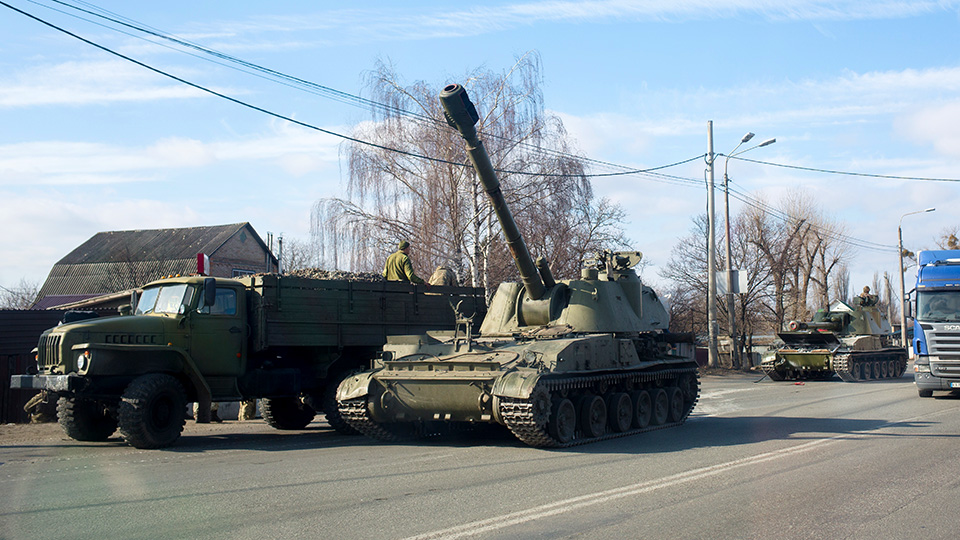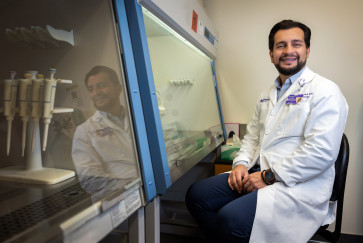As Russian forces close in on Kyiv, “a new world order” is upon us and Vladimir Putin’s invasion of Ukraine will echo for years to come, according to Jordan Gans-Morse, a Northwestern political scientist and expert on the former Soviet Union.
In order to make sense of the developing news, Northwestern Now asked Gans-Morse and several other experts to weigh in.
Ian Kelly is the ambassador-in-residence at Northwestern. Karen Alter is the Norman Dwight Harris Professor of International Relations and co-director of the Research Group on Global Capitalism and Law. Ian Hurd is a professor of political science. And, Michael Allen is an associate professor of history.
How does this situation impact the rest of the world?
"The battle between democracy and authoritarianism is being waged not only in Ukraine, but in all of Russia's periphery,” said Ian Kelly. “Putin doesn't want his neighbors to become successful democracies. For him, preventing neighbors from adopting Western, democratic standards, and forcing them to stay in the Russian orbit, are existential."
What is the true power in sanctions against Russia?
“Bullets and tanks are how Russia can win a battle, but bullets and tanks are not how Russia can win this war, nor can they deliver to Putin what he most wants,” said Karen Alter.
“For a military offensive, it may make sense to go in with shock and awe. For sanctions, an incremental strategy is, by design, necessary and best. The goal is to send a cascading message that conquest does not pay. The more violence, the higher the cost Putin will pay. The more the violence, the more others will join in the sanctioning system. This means sanctions roll out in waves, spreading the pain so that Putin’s supporters themselves start to question the war and Putin’s sanity in waging this war.”
In this case, how will sanctions be effective?
“The rest of the world doesn’t have the tools to stop Putin from taking Ukraine,” said Ian Hurd. “Russia’s military power is easily capable of taking over the country, as long as Moscow is willing to cause enormous damage and bear costs for Russia.”
“The best strategies are those that target the economic lifelines for Putin and his cohort. The Russian government gets its money from selling petroleum products to the world, and its elites stash their share of that wealth in foreign accounts and investments. For example, the U.S. and others could shut off the inflow of money to Russia by refusing to buy Russian oil and gas and and also shut off the outflow of money by seizing oligarchs’ assets around the world. And the UK could take over their real estate in London and sports teams around the country, and exclude the Russian English-language television network, RT, from its airwaves.”
Is this Putin’s way of reestablishing the Soviet empire?
“Putin’s invasion of Ukraine would seem to mark not only his determination to undo the post-Cold War status quo but to restore Russia to its place in the world order as it existed before the First World War, to a time when Russia ranked alongside the other European empires and the empire of Japan, and a time before the U.S. had emerged as the world’s leading power,” said Michael Allen.
“Ironically, Europe’s desire to avoid such a return to its bloody past likely emboldened his move and may mean it goes unchecked, at least militarily. But what Putin forgets is that imperial Russia was never internally strong to begin with, which is why it collapsed first in World War I before collapsing again to end the Cold War. Nothing he is doing now solves that problem.”
How does all of this change the world?
“We've awoken today to a new world order, one in which dictators again find it permissible to impose their will on weaker neighbors by force,” said Jordan Gans-Morse.
“The consequences of Putin’s decision to invade Ukraine will reverberate for years to come, affecting everything from his own prospects of remaining in power to China’s calculations about its policies toward Taiwan. In the meantime, Ukrainians will suffer immensely, and the rest of the world must not forget the sacrifice they are making as they seek to repel Putin’s unlawful invasion.”


